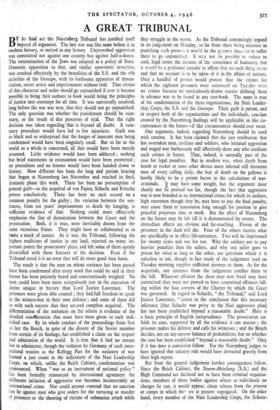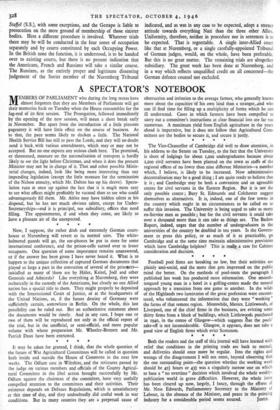A GREAT TRIBUNAL
BY Its final act the Nuremberg Tribunal has justified itself beyond all argument. The late war was like none before it in modern history, or indeed in any history. Unprovoked aggression was committed not against one country but against half-a-dozen. The extermination of the Jews was adopted as a policy of State. Domestic opposition to that, and similar systematic atrocities, was crushed effectively by the brutalities of the S.S. and the vile activities of the Gestapo, with its loathsome apparatus of denun- ciation, secret arrest and imprisonment without trial. That crimes of this character and order should go unpunished if ever it became possible to bring their authors to book would bring the principles of justice into contempt for all time. It was universally resolved, long before the war was won, that they should not go unpunished: The only question was whether the punishment should be sum- mary, or the result of due processes of triaL That the right decision was taken regarding that is beyond all doubt. A sum- mary procedure would have led to few injustices. Guilt was so black and so widespread that the danger of innocent men being condemned would have' been singularly small But so far as the world as a whole is concerned, all that would have been merely assumed. Little evidence would have been adduced ; nothing but brief statements in extenuation would have been permitted ; no precedents and no lessons would have been handed down to history. How different has been the long and patient hearing that began at Nuremberg last November and reached its final, dramatic phase this week. There has been no presumption of general guilt—as the acquittal of von Papen, Schacht and Fritsche proves conclusively. There has been no ,tacit accord on a common penalty for the guilty ; the variation between the sen- tences, from ten years' imprisonment to death by hanging, is sufficient evidence of that. Nothing could more effectively emphasise the line of demarcation between the Court and the prosecution. Both, it is true, were inevitably drawn from the same victorious States. They might have so collaborated as to make a mock of justice. As it was, the Tribunal, following the highest traditions of justice in any land, rejected on many im- portant points the prosecutors' pleas, and left some of them openly dissatisfied with those features of the decision. Even if the Tribunal erred it is an error that will do more good than harm.
The result is that the men on whom sentence has been passed have been condemned after every word that could be said in their favour has been patiently heard and conscientiously weighed. No man could have been more scrupulously just in the execution of duties unique in history than Lord Justice Lawrence. The prisoners were given able counsel ; they had full freedom to speak in the witness-box in their own defence ; and some of them did so with such success that they secured complete acquittal. The differentiation of the sentences on the others is evidence of the detailed consttleration that must have been given to each indi- vidual case. By its whole conduct of the proceedings from first to last the Bench, in spite-of the dissent of the Soviet member from certain of its findings, has established a claim on the respect and admiration of the world. It is true that it had no statute law to administer, though the violation by Germany, of such inter- national treaties as the Kellogg Paot for the outlawry of war formed a just count in the indictment of the Nazi Leadership Corps, on which, unlike the Reich Cabinet, condemnation was pronounced. When " war as an instrument of national policy " has been formally renounced by international agreement the deliberate initiation of aggressive war becomes incontestably an international crime. Nor could anyone contend that no sanction can lie against men who give orders for the torturing or murder of prisoners or the shooting of victims of submarine attack while they struggle in the waves. As the Tribunal convincingly argued in its judgement on Monday, so far from there being injustice in punishing such persons it would be the grossest injustice to suffer them to go unpunished. It may not be possible to reduce to cold, legal terms the dictates of the conscience of humanity, but it would be a profound mistake to affirm that no such thing exists and that no account is to be taken of it in the affairs of nations. Only a handful of purists would protest that the crimes for which the eighteen prisoners were sentenced on Tuesday were no crimes because no meticulously-drawn statute defining them in advance was to be found in any text-book. The same is true of the condemnation of the three organisations, the Nazi Leader- ship Corps, the S.S. and the Gestapo. Their guilt is patent, and in respect both of the organisations and the individuals, case-law created by the Nuretnberg findings will be applicable in like cir- cumstances in the future—if like circumstances should ever recur.
One argument, indeed, regarding Nuremberg should be used with caution. It has been claimed that the just retribution that has overtaken men, civilians and soldiers, who initiated aggression and waged war barbarously will effectively deter any who meditate such crimes in future. That, indeed, is normally part of the case for legal penalties. But in modern war, when. death from bomb or rocket or some other device more infernal still threatens men of every calling daily, the fear of death on the gallows is hardly likely to be a potent factor in the calculations of war- criminals. It may have some weight, but the argument must clearly not be pressed too far, though the fact that aggressive war is now branded as an international crime, for which its authors, high statesmen though they be, may have to pay the final penalty, may cause them to manoeuvre long enough for position to give peaceful professes time to work. But the effect of Nuremberg on the future may be left till it is demonstrated by events. The immediate effects are obvious and far-reaching. Eleven of the prisoners in the dock will die. Four of the others receive what are specifically or in effect life-sentences. Two will be imprisoned for twenty years and one for ten. Why the soldiers are to pay heavier penalties than the sailors, and why one sailor goes to prison for twice as long as the other, are questions which it is valueless to ask, though in fact study of the judgement read on Tuesday morning supplies sufficient answers to them. As for the acquittals, one sentence from the judgement justifies them to the full. Whatever offences the three men now freed may have committed they were not proved to have committed offences fall- ing within the four corners of the Charter by which the Court was governed. In regard to Schacht, " the Tribunal," said Lord Justice Lawrence, " comes to the conclusion that this necessary inference [that Schacht was privy to the Nazi aggressive plan] has not been established beyond a reasonable doubt." Here is a basic principle of English jurisprudence. The prosecution un- folds its case, supported by all the evidence it can muster ; the prisoner makes his defence and calls his witnesses ; and the Bench decides, not on any narrow balance of probabilities, but on whether the case has been established " beyond a reasonable doubt." Only if it has does a conviction follow. For the Nuremberg judges to have ignored that salutary rule would have detracted gravely from their high repute.
But from the general judgement further consequences follow. Since the Reich Cabinet, the Sturm-Abteilung (S.A.) and the High Command are declared not to have been criminal organisa- tions, members of those bodies against whom as individuals no charges lie can, it would appear, claim release from the prisons or camps in which they are at present segregated. On the other hand, every member of the Nazi Leadership Corps, the Schutz-1 Staffel (S.S.), with some exceptions, and the Gestapo is liable to prosecution on the mere ground of membership of those sinister bodies. Here a different procedure is involved. Whatever trials there may be will be conducted in the four zones of occupation separately and by courts constituted by each Occupying Power. In the British zone the function, it is understood, is to be handed over to existing courts, but there is no present indication that the Americans, French and Russians will take a similar course. The Russians, as the entirely proper and legitimate dissenting judgement of the Soviet member of the Nuremberg Tribunal indicated, and as was in any case to be expected, adopt a sterner attitude towards everything Nazi than the three other Allies. Uniformity, therefore, neither in procedure nor in sentences is to be expected. That is regrettable. A single inter-Allied court like that at Nuremberg, or a single carefully-appointed Tribunal of German judges, would, on the whole, have been preferable. But this is no great matter. The remaining trials are altogether subsidiary. The great work has been done at Nuremberg, and in a way which reflects unqualified credit on all concerned—the German defence counsel not excluded.































 Previous page
Previous page